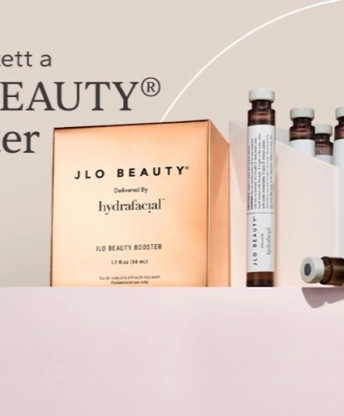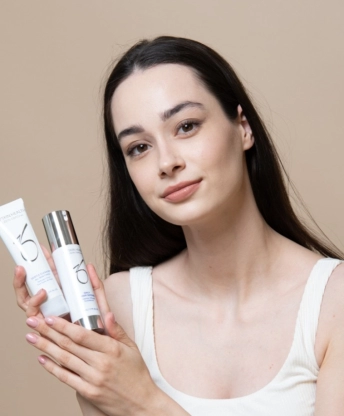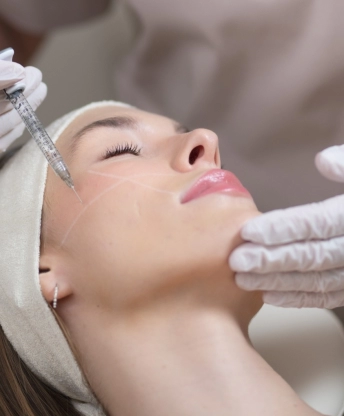Beauty from within – Dietary tips for radiant skin
Have you always dreamed of radiant, flawless skin? You might not have realized it, but alongside a well-structured skincare routine, a few lifestyle changes are essential for achieving a glowing complexion. This includes maintaining a balanced diet and getting adequate sleep.
In the following section, Trenka Andrea Petra, a certified dietitian at Zenon Clinic, shares expert tips to help you radiate beauty not just on the outside, but from within as well!

Many forget that radiant skin isn’t just about the right cosmetics—it’s also about internal care. What you eat and what you avoid in your daily life significantly impacts the condition of your skin. According to Trenka Andrea Petra, a dietitian at Zenon Clinic, achieving balance in two key areas is crucial: prioritizing nutrition that supports skin health and reducing inflammatory and aging factors that can harm your skin. Let’s take a closer look at what influences skin health the most!
Factors Affecting Skin Health: It’s clear that everyone’s skin is different. Some people naturally achieve a glowing complexion more easily than others due to various factors.
The key factors influencing skin health include:
- Genetics: Did you know that your genes can make you more prone to dry or dull skin? Certain dry skin conditions, such as atopic dermatitis, are linked to genetic predispositions.
- Hormones: Fluctuations in hormone levels can trigger breakouts and change how oily or dry your skin is. This is especially common during puberty, pregnancy, and menopause.
- Health conditions and medications: If someone has underlying health issues or takes medications, these can impact skin health. For instance, hormonal contraception can have both positive and negative effects on the skin.
- Environment: Sun exposure, extreme temperatures, dry air, cigarette smoke, and pollution can all negatively affect the skin.
- Lifestyle choices: Hydration, diet, sleep, stress levels, and exercise all influence how your skin looks and feels.
While not all of these factors can be controlled, a balanced diet can significantly improve skin health and appearance.
The role of nutrition in skincare
Many people rely on various skincare products to achieve radiant skin, but they often overlook the crucial role of nutrition in maintaining healthy, vibrant skin.
While cosmetic treatments can enhance beauty, the foundation of long-lasting results is always a balanced, nutrient-rich diet. Your skin—the largest organ in your body—directly reflects your overall health. What you eat has a direct impact on your skin’s glow and condition. That’s why many notice breakouts after indulging in greasy fast food or sugary treats.
The hydration, elasticity, and youthful appearance of your skin greatly depend on your intake of vitamins, minerals, antioxidants, and essential fatty acids. Even with a consistent external skincare routine, your efforts might not yield the desired results without internal support.
To promote glowing skin, avoid foods high in sugar, saturated fats, and salt, as they can trigger inflammation, accelerate aging, and deteriorate skin quality. Instead, focus on nutrient-dense foods such as:
- Fresh fruits and vegetables
- Whole grains
- Lean proteins
- Healthy fats (e.g., olive oil, avocado, nuts)
Certain nutrients are particularly vital for skin health, including:
- Vitamin C – Boosts collagen production and protects the skin from oxidative stress.
- Vitamin E – Acts as an antioxidant, shielding cell membranes from damage.
- Omega-3 fatty acids – Reduce inflammation and support skin hydration.
Next, let’s explore expert dietitian tips to help you maintain radiant skin long-term!
The pillars of beauty maintenance
High Antioxidant Intake
You’ve probably heard about the benefits of antioxidants. These compounds protect against environmental stress, neutralize free radicals, and contribute to a youthful complexion. The best sources of antioxidants include dark green, bright yellow, and purple vegetables and fruits like kale, carrots, blueberries, and beets.
Antioxidants prevent premature aging and common skin issues by reducing oxidative damage. Regular consumption of antioxidant-rich foods preserves skin elasticity and helps maintain a youthful glow.
Natural Sources of Vitamin C and E
Vitamin C plays a key role in collagen production, ensuring skin elasticity. The best sources include citrus fruits, yellow peppers, cherries, kiwi, and spinach.
Vitamin E, on the other hand, acts as an antioxidant that protects cell membranes from oxidative stress. Great sources include almonds, sunflower seeds, pine nuts, and cold-pressed oils like wheat germ and hazelnut oil.
Together, these vitamins support skin regeneration and protect against external environmental stressors.
Reducing sugar intake
Excess sugar has numerous negative effects on the body, including accelerating aging and triggering inflammation. Avoid processed foods high in refined sugars, such as sweets, sauces, salad dressings, and salty snacks. Instead, opt for natural sugar sources like fruits, but consume them in moderation.
Did you know that processed foods high in sugar can contribute to acne and oxidative stress? This can lead to premature skin aging, so it’s best to cut down on unnecessary sugary treats!
Consuming healthy fats
Omega-3 fatty acids help reduce inflammation, strengthen cell membranes, and support circulation. The best sources include fatty fish, olive oil, and flaxseeds.
Regular intake of healthy fats improves skin hydration, reduces inflammation, and promotes a natural, radiant glow.
Balancing your diet
The key to radiant skin is balancing beneficial and harmful dietary factors. Prioritize skin-nourishing foods while minimizing those that promote inflammation and aging! When planning your meals, always consider how nutrition can enhance your beauty from within.
Hydration and Sleep – Essential for Skin Health
Proper sleep (ideally 9-10 hours for women) and adequate daily water intake are crucial for maintaining skin elasticity and overall health.
It’s no secret that hydration is key to achieving glowing skin. Drinking 2-3 liters of water daily supports the skin’s natural detoxification processes and helps maintain its moisture balance.
When Should You See a Dietitian?
If you’ve tried everything but still struggle with skin issues, consulting a dietitian might be the next step. Nutritional counseling is a great opportunity if you’re planning a lifestyle change, want to proactively care for your health, or need dietary solutions for an existing condition. Food intolerances and allergies also require expert guidance.
Our dietitian provides personalized nutrition plans and practical advice to help you find the ideal diet for your skin and overall health.
Your Skin’s Beauty and Health Start from Within!
The first step to glowing skin is adopting a conscious, nutrient-rich diet. By implementing healthy lifestyle habits, you can significantly improve your skin’s condition. At Zenon Clinic, we believe that the key to sustainable, enjoyable lifestyle changes lies in harmonizing different aspects of daily life.
Our dietitian is committed to making lifestyle changes feel effortless and rewarding rather than overwhelming.
Want to look and feel your best in 2025?
Book an appointment today for a comprehensive nutrition consultation with Trenka Andrea Petra, who will help you find the best diet for your skin and well-being.
We’re here to support you on your journey!



